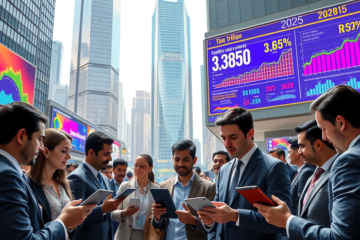Challenges of Economic Growth and Innovation
Economic Growth is a crucial issue for Brazil, which currently faces significant challenges due to low investment in science and innovation.
In this article, we will explore how institutional barriers and dependence on commodities affect the Brazilian economy.
Additionally, we will address the political polarization intensified by social media, which hinders the implementation of long-term policies.
Leadership in regulating digital platforms and taxing online advertising emerge as possible solutions.
We will also discuss political fragmentation and the risks of recession in the US, which could impact the growth trajectory of Brazil and other emerging market countries.
Panorama of Brazilian Economic Growth
Brazil's economic growth has been affected by a series of factors that limit its potential.
One of the main ones is the lack of investment in science and innovation, fundamental to driving technological development.
Furthermore, institutional obstacles complicate the business environment, discouraging entrepreneurs from investing in the country.
Another critical aspect is the commodity dependence, which leaves the Brazilian economy vulnerable to fluctuations in the international market.
The political landscape, marked by intense polarization, aggravates the situation by making it difficult to implement long-term public policies.
According to a report by the Institute of Applied Economic Research, the lack of political consensus is one of the main challenges to the country's sustainable growth (Ipea Macroeconomic Forecasts).
This mix of factors creates a complex environment that imposes significant barriers to Brazil's economic expansion.
Low Investment in Science and Innovation
The lack of adequate investment in research and development (R&D) in Brazil directly impacts the country’s productivity and competitiveness.
According to recent data, Brazil invested only 1.19% of GDP in R&D in 2023, while the average for countries in the OECD is about 2.4% of GDP.
This discrepancy reflects the stagnation in the country's technological advancement, limiting companies' ability to adapt to new trends and technologies.
The following comparative table illustrates the substantial difference in investments:
| Country | Investment in R&D (% of GDP) |
|---|---|
| Brazil | 1,19% |
| OECD | 2,4% |
The lack of resources for innovation leads to a cycle of low productivity, as reported by several analyses.
This scenario could be reversed with strategies to stimulate investment in science and innovation, which can be seen as a path to improving economic competitiveness.
Institutional Barriers and Commodity Dependence
A excessive bureaucracy and the legal uncertainty in Brazil create an unfavorable environment for investments in the productive sector, reinforcing the country's dependence on commodity exports.
This problem is intensified by regulatory fragmentation, which discourages entrepreneurs and investors from diversifying their portfolios, limiting the possibilities of economic diversification.
“The complexity and cost of complying with regulations inhibit business competitiveness,” according to an analysis by the World Economic Forum.
Additionally, unpredictable fiscal policy aggravates the situation, making Brazil less attractive compared to other emerging markets.
These conditions contribute to the reprimarization of the economy, since agriculture and mining, sectors less impacted by severe regulations, account for a significant portion of exports.
Thus, dependence on commodities persists as a central economic challenge, limiting advances in more technological areas.
Improving institutional policies is crucial to changing this landscape and fostering an environment more conducive to innovation and sustainable growth.
Political Polarization and Social Networks
The intense political polarization in Brazil, amplified by social media, increases the challenges in formulating long-term economic policies.
According to a recent study mentioned in Economic Value, even though this phenomenon is losing ground on social media, its effects continue to significantly impact the ability to reach consensus among political actors.
Polarization turns every political issue into an arena of combat, hindering collaboration and constructive dialogue.
Furthermore, this intense division limits the country's ability to create and implement innovative policies that could stimulate investment in science and innovation.
With constant conflict, essential reforms are paralyzed, compromising Brazil's economic growth.
We need to recognize the challenging role of social networks in amplifying these divisions, often through the spread of misinformation, as pointed out by media experts.
- Erosion of dialogue
- Reforms halted
- Low predictability
Regulation of Digital Platforms and Online Taxation
Brazil's leadership in regulating digital platforms can transform the Brazilian digital economy, promoting not only economic growth but also an environment for innovation.
Adopting a leading position in this field can generate a fair taxation on online advertising, ensuring that large platforms contribute equitably to the country's economy.
The new legislation seeks to recognize that these platforms do not simply act as intermediaries, but also organize and control services, justifying their fiscal responsibility.
This movement can bring significant benefits, such as increased revenue, greater distribution of resources and incentives for local innovation.
Furthermore, by regulating these markets, Brazil could mitigate economic dependence on commodities, establishing a sustainable path to growth.
According to the government, platforms may be subject to transparency rules and specific obligations, as detailed in the Project for competition regulation of Big Techs, which promotes competitiveness and ensures a robust digital economy.
These measures can boost public trust and contribute to social cohesion in an increasingly digitalized economic landscape.
Political Fragmentation and Lack of Consensus
A party fragmentation in Brazil is a significant challenge for the country's governability.
With a substantial number of parties representing diverse ideologies, the formation of coalitions becomes essential to maintain stability and approve reforms.
However, this need for alliances often results in concessions that compromise the effectiveness of public policies.
The multi-party structure, evidenced by the large number of acronyms, does not facilitate the consensus necessary to implement long-term changes, leading to a government that operates in a constant cycle of political negotiations.
This situation is even more complex when we consider the pressure to balance state and federal interests.
Consequently, the country faces difficulties in approving structural reforms that could stimulate economic growth, leaving it at the mercy of external fluctuations, such as possible recession in the US.
Thus, the political instability and the lack of consensus are barriers that delay the economic progress necessary to compete on the global stage.
Recession Risks in the US and Impact on Brazil
A recession in the United States can have a profound impact on the Brazilian economy, mainly due to demand reduction put Brazilian exports.
With the US as one of Brazil's main trading partners, any US economic slowdown could lead to a significant decline in sales of products such as soybeans and iron ore.
Furthermore, the recession in the US tends to increase the financial volatility, negatively affecting emerging markets.
O dollar may appreciate even further against the real, increasing import costs and putting pressure on inflation in Brazil.
Amid rising global risk perception, investors may withdraw capital from emerging markets, making the need for risk mitigation strategies even more urgent.
As experts have reported, the recession in the US could “harm important Brazilian sectors” [Source BBC].
- Exchange rate instability
- Reduction in demand for commodities
- Flight of foreign capital
This scenario requires Brazil to strengthen its economic planning and seek to diversify its trade partnerships to mitigate the impacts of this possible recession.
Political Crises and Obstacles to Innovation
In Brazil, the recurring political crises generate an environment of instability that profoundly affects progress in innovation and sustainable development.
The frequent tensions between the powers, detailed in the article by Fecomercio, create an unfavorable scenario for long-term investment, especially in critical sectors such as science and technology.
This is because, faced with a government marked by divisions and a lack of consensus, companies face difficulties in trusting in a continuous innovation project.
Furthermore, the impact of political disputes causes a blockage in technological initiatives.
“The instability generated by economic policy hinders progress in innovation”
, as analyzed by Samuel Pessoa, which highlights this issue as one of the mistakes repeated by the nation.
As a result, Brazil remains economically dependent on commodities and faces difficulties in achieving sustainable growth, further complicating an economy already weakened by the rapid polarization promoted by social media.
This complex reality, really hurts the country's ability to modernize and reach higher levels of economic development.
In summary, Brazil faces significant barriers to its economic growth, aggravated by controversial crises and polarization.
To overcome these challenges, it is essential to foster innovation and seek political consensus that aims for sustainable development.



0 Comments